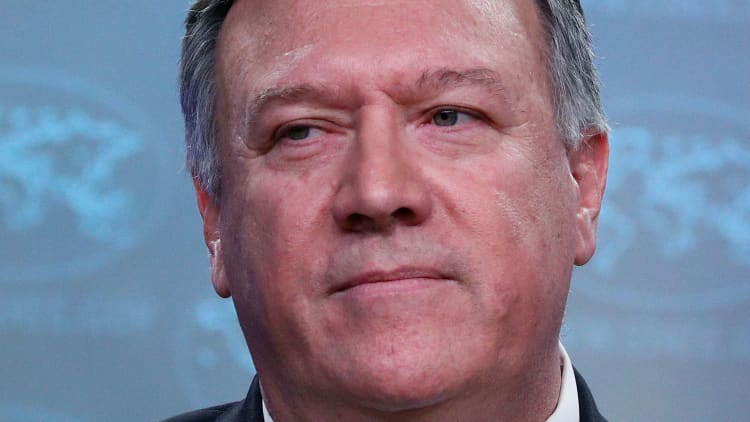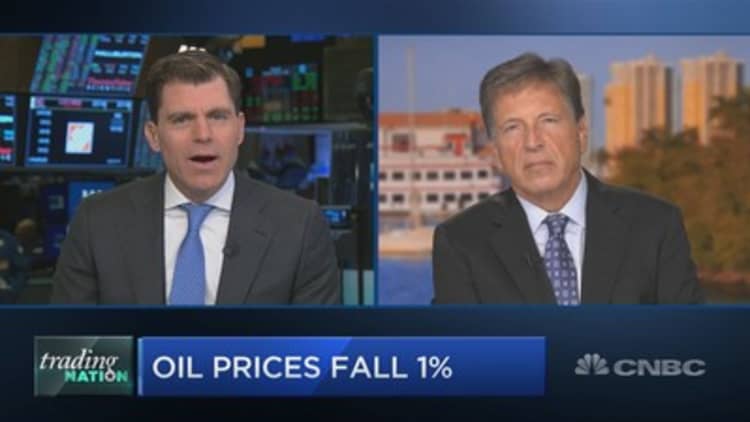
Iran launched more than a dozen ballistic missiles against two bases housing U.S. troops in Iraq, Pentagon officials said Tuesday night.
No casualties were immediately reported in the strikes. The White House decided against a formal address to the nation Tuesday night.
U.S. stock futures plunged on Tuesday night following the news. Dow Jones Industrial Average futures initially plunged and oil prices surged, but U.S. stocks were trading higher Wednesday morning and oil prices fell.
President Donald Trump responded to Tuesday night's attacks on Twitter: "All is well!" he said. "Missiles launched from Iran at two military bases located in Iraq. Assessment of casualties & damages taking place now. So far, so good! We have the most powerful and well equipped military anywhere in the world, by far! I will be making a statement tomorrow morning."
Following reports of the attacks, White House press secretary Stephanie Grisham said Trump "has been briefed and is monitoring the situation closely and consulting with his national security team." Vice President Mike Pence, Secretary of Defense Mark Esper and Army Gen. Mark Milley were at the White House on Tuesday night.
Trump previously visited one of the bases that came under attack on Tuesday.
Iranian Foreign Minister Mohammad Javad Zarif tweeted after the attack that "we do not seek escalation or war, but will defend ourselves against any aggression."
"Iran took & concluded proportionate measures in self-defense under Article 51 of UN Charter targeting base from which cowardly armed attack against our citizens & senior officials were launched. We do not seek escalation or war, but will defend ourselves against any aggression," Zarif tweeted.
Pence briefed House Speaker Nancy Pelosi by phone Tuesday evening, the speaker's spokesman Drew Hammill said.
In a tweet, Pelosi said she was "closely monitoring the situation."
"We must ensure the safety of our servicemembers, including ending needless provocations from the Administration and demanding that Iran cease its violence. America & world cannot afford war," she said.
Former Vice President Joe Biden said he would hold off commenting on Tuesday's attacks until he had more information, but added: "Jill and I are keeping our troops and Americans overseas in our prayers. We hope you'll keep them in yours."
Assistant to the Secretary of Defense for Public Affairs Jonathan Hoffman released the following statement after the attacks:
"At approximately 5:30 p.m. (EST) on January 7, Iran launched more than a dozen ballistic missiles against U.S. military and coalition forces in Iraq. It is clear that these missiles were launched from Iran and targeted at least two Iraqi military bases hosting U.S. military and coalition personnel at Al-Assad and Irbil. We are working on initial battle damage assessments."
Hours before the missile attacks, Esper said the U.S. was not seeking a war with Iran.
"We are not looking to start a war with Iran, but we are prepared to finish one," Esper said, adding that Washington wants to see the situation de-escalate.

The missile strikes, launched from Iran, follows the U.S. killing of Iran's top general, Qasem Soleimani last week. Tensions in the Middle East rose following his death, and the U.S. braced for a response.
Saeed Jalili, secretary of Iran's Supreme National Security Council, appeared to mock Trump by tweeting out a picture of the Iranian flag following Tuesday's attacks. Trump had tweeted out a photo of the U.S. flag after the attack on Soleimani.
Earlier in the day, Secretary of State Mike Pompeo said the U.S. "got it right" by killing Soleimani.
"It was the right decision," he said. "The Department of Defense did excellent work. And the president had an entirely legal, appropriate and a basis as well as a decision that fit perfectly within our strategy in how to counter the threat of malign activity from Iran more broadly."
Trump has said Soleimani was planning a big attack. He also told reporters in the Oval Office that a lot of lives were saved by killing Soleimani. The U.S., he said, is prepared for possible retaliation by Iran.
Trump tweeted Saturday that he had 52 potential targets, some of which are "very important to Iran & the Iranian culture," if Tehran retaliated for the killing. He wrote that if Iran strikes any "Americans, or American assets," it "WILL BE HIT VERY FAST AND VERY HARD."
Trump has repeatedly said he wants to end ongoing U.S. wars in the region, but his critics warned killing Soleimani could lead to even more conflict and loss of life.
"An attack by a large handful of ballistic missiles is a show of force and an expression of Iranian military strength, but also signals their weakness," Thomas Karako, director of the Missile Defense Project at the Center for Strategic and International Studies, told CNBC.
"Their growing and diversified missile arsenal poses a real threat, but the overall military balance is certainly not in their favor."
Protracted tensions could also upend global energy markets, as Iran is one of the largest oil producers in the world.
Tensions between Tehran and Washington have escalated following Trump's withdrawal from the landmark Iran nuclear deal brokered by the Obama administration.
The 2015 nuclear agreement lifted sanctions that crippled Iran's economy and cut its oil exports roughly in half. In exchange for sanctions relief, Iran accepted limits on its nuclear program and allowed international inspectors into its facilities.
On Sunday, Iran announced it would not abide by any limits established in the 2015 nuclear deal on the number of uranium enrichment centrifuges.
Therefore, Iran would have no limit on its enrichment capacity, the level to which uranium could be enriched, or Iran's nuclear research and development. Iranian state-run broadcast said Tehran's steps could be reversed if Washington lifted its sanctions.
Last May, Iran stopped complying with some commitments in the 2015 nuclear deal after Trump in 2018 unilaterally withdrew from the agreement. Trump also reintroduced sanctions on Tehran that had been previously lifted in accordance with the nuclear deal.

Correction: This story was updated to correct the wording of Trump's Saturday tweet about retaliating against Iran.

